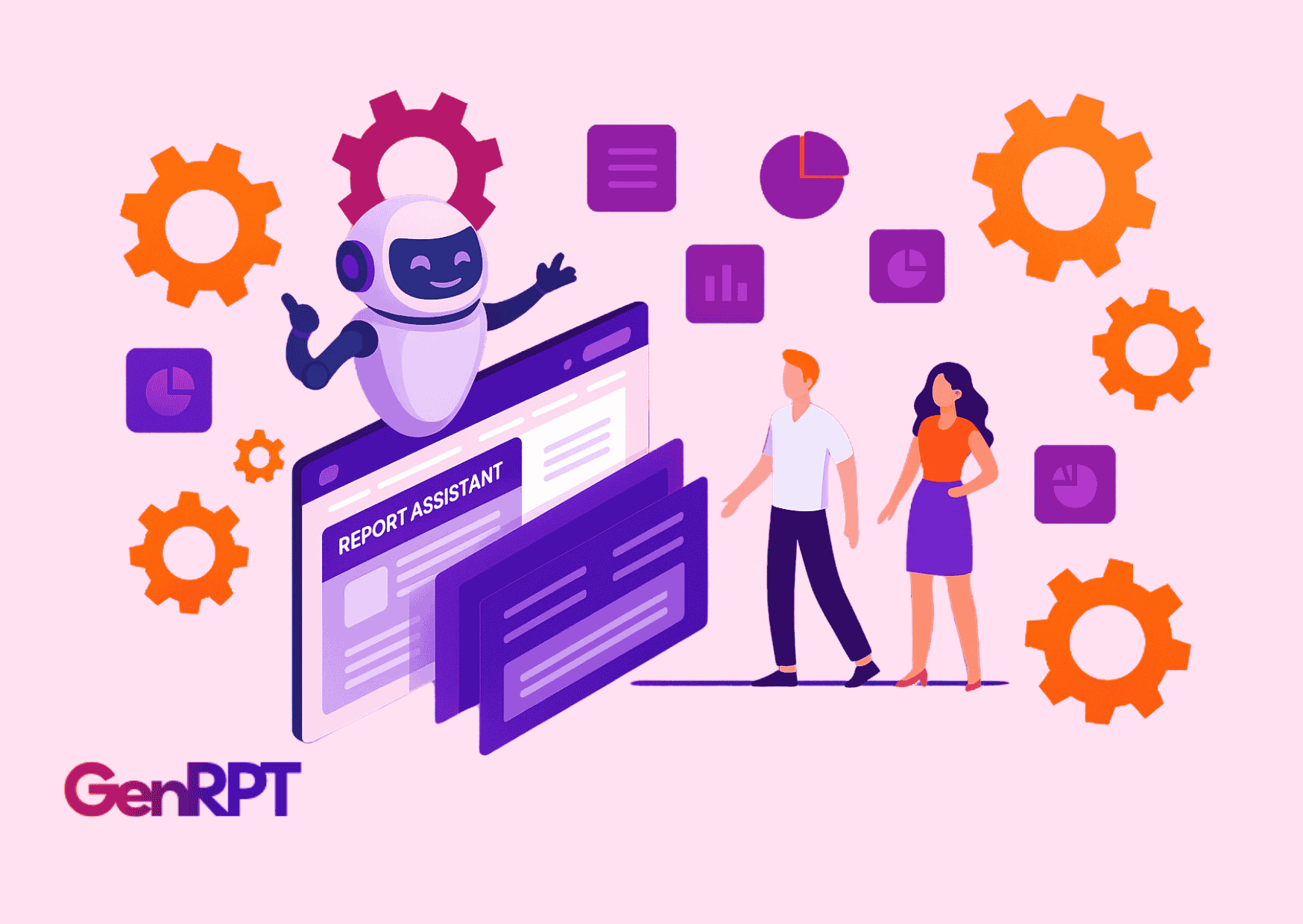
Future Outlook: Will Every Boardroom Have an AI Report Assistant?
September 26, 2025 | By GenRPT
Boardrooms thrive on clarity. Every quarter, leadership teams are flooded with financial reports, equity research, and market updates that can stretch into hundreds of pages. Yet research shows that CEOs spend nearly 70% of their meeting time processing data instead of making decisions. That imbalance highlights the urgent need for change.
This is where artificial intelligence (AI) is stepping in. Tools like GenRPT, designed to generate structured reports and instant insights, show how the boardroom of tomorrow may have an AI report assistant as a permanent fixture.
Why AI Report Assistants Are Gaining Ground
For years, the question “what is AI?” was confined to labs and tech conferences. Now, it is being asked inside boardrooms. Executives are realizing that AI technology can turn complex financial and market data into insights that are faster, clearer, and easier to act upon.
1. Equity research reports that once took weeks can be generated in minutes.
2. Market risk analysis can be simulated with a few queries.
3. AI-driven analytics can answer direct questions like, “What is our current equity market outlook?” in real time.
Instead of just automating tasks, AI-powered automation is giving leaders a new way to see their business, one that is proactive rather than reactive.
From Data Overload to Boardroom Decisions
Executives don’t need more data. They need the right insights at the right time. With LLM-powered workflows, NLP, and AI agents, the shift is underway:
1. Investment research becomes streamlined when AI for data analysis pulls together signals from financial reports, analyst reports, and macroeconomic outlooks.
2. Autonomous agents can run portfolio risk assessments and highlight potential exposure before it becomes a board-level crisis.
3. AI workflows ensure that the same insights are consistently available across leadership, from portfolio managers to wealth advisors.
The result is less time on repetitive reporting and more time making strategic moves.
Where GenRPT Fits In
GenRPT is designed to bring this future into practice. Built as a generative AI software solution, it serves as a bridge between equity analysis and executive-ready reporting.
1. It delivers structured financial insights in formats that boards can immediately use.
2. It works with workflow agents and knowledge-based systems, streamlining everything from audit reports to investment insights.
3. Its AI report generator ensures equity research automation at scale, cutting down the effort of data mining and manual compilation.
For financial advisors, asset managers, and investment analysts, this means reports that are no longer delayed by human bottlenecks. For companies, it means decision-making can keep pace with market changes.
Agentic AI and the Next Evolution
The rise of agentic AI is key to why this transformation feels inevitable. In reporting, a network of multi-agent systems can handle tasks together:
1. One AI agent tracks real-time market trends.
2. Another produces an equity research report with valuation methods and performance measurement.
3. A third runs scenario analysis for portfolio insights.
These autonomous systems make it possible to prepare for board meetings with a completeness that traditional methods struggle to match. With GenRPT, such systems can operate seamlessly, offering leadership a 360-degree equity market outlook.
What It Means for the Boardroom
Picture a board meeting five years from now. Instead of a hundred-slide deck, the CEO asks the assistant:
1. “How has our equity performance shifted compared to last quarter?”
2. “Where does our geographic exposure create the most portfolio risk?”
3. “What are the top three insights from current analyst reports?”
The assistant responds instantly, powered by deep learning, semantic search, and AI data analysis. This isn’t science fiction, it’s what early adopters are already testing.
And here’s the kicker: companies using AI in business for decision support are reporting 20–30% faster strategic turnarounds. That speed can be the difference between capturing market share or losing it.
The Roadblocks Ahead
Of course, adoption is not automatic. To make AI report assistants mainstream, companies will need:
1. Explainable AI to ensure leaders trust the insights.
2. Responsible AI practices to handle sensitive financial data.
3. Reliable AI frameworks to integrate with existing ERP systems and reporting tools.
But these challenges are solvable, and many firms are already moving toward AI innovation in reporting.
Will Every Boardroom Have One?
The trajectory is clear. Just as financial reports moved from paper binders to digital dashboards, the leap to AI-powered assistants is next. Their ability to combine investment insights, equity research automation, and financial forecasting makes them too valuable to ignore.
GenRPT is already leading this shift. By combining agentic frameworks, AI-driven analytics, and autonomous agents, it shows how decision-making can be not just faster but smarter.
Conclusion
Boardrooms are built on decisions, and decisions thrive on clarity. AI report assistants are not just a possibility, they are the next standard. With solutions like GenRPT, leadership teams can expect equity research reports and financial insights to arrive faster, cleaner, and more accurate than ever.
The question is no longer if every boardroom will have one, but when.
